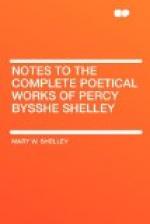I may mention, for the information of the more critical reader, that the verbal alterations in this edition of “Prometheus” are made from a list of errata written by Shelley himself.
NOTE ON THE CENCI, BY MRS. SHELLEY.
The sort of mistake that Shelley made as to the extent of his own genius and powers, which led him deviously at first, but lastly into the direct track that enabled him fully to develop them, is a curious instance of his modesty of feeling, and of the methods which the human mind uses at once to deceive itself, and yet, in its very delusion, to make its way out of error into the path which Nature has marked out as its right one. He often incited me to attempt the writing a tragedy: he conceived that I possessed some dramatic talent, and he was always most earnest and energetic in his exhortations that I should cultivate any talent I possessed, to the utmost. I entertained a truer estimate of my powers; and above all (though at that time not exactly aware of the fact) I was far too young to have any chance of succeeding, even moderately, in a species of composition that requires a greater scope of experience in, and sympathy with, human passion than could then have fallen to my lot,—or than any perhaps, except Shelley, ever possessed, even at the age of twenty-six, at which he wrote The Cenci.
On the other hand, Shelley most erroneously conceived himself to be destitute of this talent. He believed that one of the first requisites was the capacity of forming and following-up a story or plot. He fancied himself to he defective in this portion of imagination: it was that which gave him least pleasure in the writings of others, though he laid great store by it as the proper framework to support the sublimest efforts of poetry. He asserted that he was too metaphysical and abstract, too fond of the theoretical and the ideal, to succeed as a tragedian. It perhaps is not strange that I shared this opinion with himself; for he had hitherto shown no inclination for, nor given any specimen of his powers in framing and supporting the interest of a story, either in prose or verse. Once or twice, when he attempted such, he had speedily thrown it aside, as being even disagreeable to him as an occupation.




